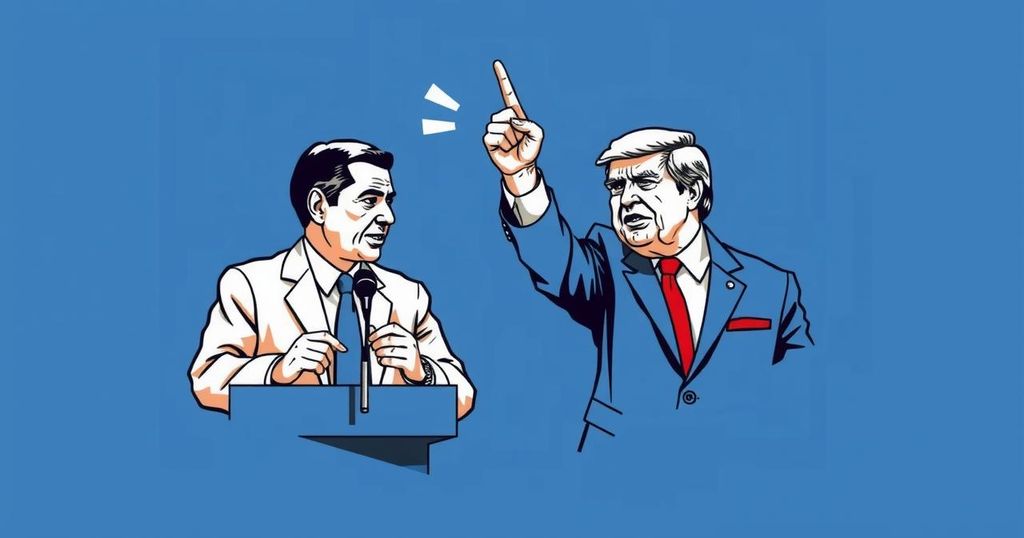Uruguay’s Presidential Runoff: A Contest Between Moderates

Uruguay’s closely contested presidential runoff on November 24 features center-left candidate Yamandu Orsi against conservative Alvaro Delgado, backed by the Colorado Party. Polls indicate a tight race, with fewer than 25,000 votes separating the candidates. The election underscores Uruguay’s political stability and moderates, with a significant portion of undecided voters. Both candidates strive to attract votes from smaller parties and abstainers, yet they have not introduced new pledges in their final campaign efforts.
Montevideo, Uruguay – On Sunday, Uruguayan citizens will participate in a closely contested second-round presidential election amidst a backdrop of political stability and moderate political discourse. The runoff features center-left candidate Yamandu Orsi and conservative Alvaro Delgado, the latter endorsed by the third-placed Colorado Party. Recent polls indicate that the competition will be exceptionally close, with a potential margin of fewer than 25,000 votes separating the candidates.
Uruguay, home to approximately 3.4 million residents, is characterized by its laid-back lifestyle and progressive policies, including marijuana legalization. Unlike the polarized political environments observed in neighboring countries like Argentina and Brazil, Uruguay showcases a more collaborative political landscape. Polling stations will open from 8 a.m. to 7:30 p.m. local time, with initial results anticipated within two hours post-closing.
Yamandu Orsi, representing the Broad Front, secured 43.9 percent in the initial voting round, while Alvaro Delgado garnered 26.8 percent of the votes. Orsi aims to implement a “modern left” strategy, reassuring voters of continuity without drastic shifts. In contrast, Delgado, who advocates for maintaining the current government’s course, is buoyed by the popularity of the outgoing President Lacalle Pou, who is ineligible for immediate reelection.
The lower house will lack a clear majority following the elections; however, Orsi’s Broad Front controls 16 of the 30 Senate seats, which he claims positions him favorably for governance. Both candidates are vying for the votes of the approximately 8 percent who favored smaller parties in the first round, alongside those who abstained from voting previously.
Nevertheless, their final campaign efforts have largely lacked fresh commitments to attract undecided voters, indicating that the televised debate held on November 17 may have been ineffective in swaying public opinion. “I do not know who I am voting for,” expressed Rosario Gusque, a resident of Canelones and supporter of Orsi.
As 2023 heralds the conclusion of a notable election year, observers speculate whether Uruguay can defy a global trend of declining support for incumbents amidst economic challenges affecting many nations. A robust economy may prove advantageous for Delgado as analysts note that proposals for significant political changes are scarce among voters.
Uruguay, known for its progressive policies and political stability, is poised to conclude its electoral year with a significant second-round presidential election. The country’s political landscape is marked by a relative calm compared to that of its regional neighbors, where polarized elections have been common. The upcoming election features a contest between moderates, with candidates reflecting both center-left and conservative ideologies, emblematic of Uruguay’s balance between progressivism and conservativism. The importance of this election lies in its potential to determine the future governance style of the nation, especially amid external pressures like economic fluctuations and social expectations.
In summary, Uruguay’s presidential runoff on November 24 will feature a close contest between Yamandu Orsi and Alvaro Delgado, set against a backdrop of political moderation and stability. With final polls indicating a narrow race and a substantial percentage of undecided voters, the outcome remains uncertain. The political dynamics in Uruguay suggest that while immediate change may not be pressing, the results could reflect broader sentiments about governance and the economy as the world faces various challenges.
Original Source: www.arabnews.com







